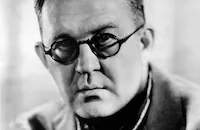Seven Women

Brief Synopsis
Cast & Crew
John Ford
Anne Bancroft
Sue Lyon
Margaret Leighton
Flora Robson
Mildred Dunnock
Film Details
Technical Specs

Synopsis
In the 1930's Mongol Tunga Khan is terrorizing the people of the Chinese border. In the area is an American mission headed by prim, iron-willed Agatha Andrews. Assisting her are admiring Jane Argent, young Emma Clark, ineffectual teacher Charles Pether, and his frightened, pregnant wife, Florrie. At first glad to hear that a Dr. Cartwright will soon be joining them, Agatha is displeased when the doctor turns out to be a cynical, worldly woman. The conflict between the two women is sharpened with the arrival of cholera-bearing refugees from the nearby ravaged British mission headed by Miss Binns, and matters are not helped by Agatha's refusal to provide the funds necessary to send Florrie to a hospital. When the Chinese soldiers protecting the area depart, Pether, with new courage, sets out to seek news but is killed. Tunga Khan and his forces storm into the mission as Florrie's labor pains begin. To pacify the invaders, Dr. Cartwright agrees to give herself to the warlord once she has delivered the baby; then, after the child is born, she uses her new power over Tunga Khan to provide for the pressing needs of the women and child. Miss Andrews, hysterically losing control, condemns Dr. Cartwright as a wanton and lustful woman, but the others understand her sacrifice. Dr. Cartwright then gets Tunga Khan's permission for the women to leave the mission. After their departure, she secretly poisons some wine and shares a toast with the warlord.

Director

John Ford
Cast

Anne Bancroft

Sue Lyon

Margaret Leighton

Flora Robson

Mildred Dunnock

Betty Field

Anna Lee

Eddie Albert

Mike Mazurki

Woody Strode
Jane Chang
Hans William Lee
H. W. Gim
Irene Tsu
Crew
G. Rex Bailey
Elmer Bernstein
George W. Davis
Henry Grace
Janet Green
Sydney Guilaroff
Eddie Imazu
J. Mcmillan Johnson
Joseph Lashelle
Otho Lovering
John Mccormick
Jack Mills
Franklin Milton
Phil Mitchell
Walter Plunkett
Bernard Smith
Wingate Smith
William Tuttle

Photo Collections
Videos
Movie Clip


Trailer
Film Details
Technical Specs

Articles
Seven Women
While Ford could be a tyrant on film sets (reports of his public humiliation of certain actors is legend), he was on his best behavior for Seven Women, possibly because he knew it would be his final feature. As co-star Anna Lee recalled in John Ford: The Man and His Friends by Tag Gallagher, "I think he was ready for it because he was absolutely charming to everybody. We'd break for tea as we always did at 4:30 and have the table brought out and the teapot and the cakes. He was particularly gracious on this one, never raised his voice." Well, there WAS one unfortunate incident; a confrontation with actress Flora Robson who protested that her dressing room door lacked "Dame" before her name. Lee added that "I saw her being absolutely shredded, because she did not realize you could not argue with or question Mr. Ford. It was always like that when someone was new."
Patricia Neal was originally cast as Dr. D. R. Cartwright, the gutsy doctor eventually played by Bancroft, but was felled by a stroke just a few days after filming commenced. Otherwise, Seven Women was a relaxed shoot that was filmed entirely on a sound stage since Ford's poor health prevented him from traveling to China for location shooting. Nevertheless, Ford's working methods never ceased to surprise some of his cast and crew members, particularly producer Bernard Smith, who, according to Anna Lee, "would come over to the long table (where the cast gathered) with new pages hot off the wire. Ford would lift his patch and look at them, study them for a few moments, and then deliberately, right in front of Bernie Smith, he would throw them on the floor, and say, 'Now, improvising the dialogue," and that's why I don't think probably more than a dozen pages in the original script were ever used." How much was really improvised, however, is debatable since a comparison between the screenplay and the film show few major differences, other than the staging and some slang verbiage, like Bancroft's final line to Mazurki before poisoning him, 'So long, you bastard.'
Another point of interest in Seven Women: it reunited Ford with one of his favorite actors, Woody Strode, who played the lead in Ford's Sergeant Rutledge (1960) as well as prominent roles in Two Rode Together (1961) and The Man Who Shot Liberty Valance (1962). In his autobiography, Goal Dust, Strode wrote, "There were two Chinese leading roles in Seven Women. I got one, and Mike Mazurki played the other. He and I fight over a missionary woman and I get killed out of the picture. This time the make-up people put rubber over my eyes and stuck a pigtail on my head. The Chinese musclemen working on the film said, 'Woody, you look more Chinese than we do.'" It was while Strode was working on Seven Women that director Richard Brooks offered him a role in The Professionals (1966) which guaranteed him star-billing for the first time, alongside Burt Lancaster, Lee Marvin, and Robert Ryan.
Producer/Director: John Ford
Screenplay: Janet Green, John McCormick
Production Design: Henry W. Grace, Jack Mills
Cinematography: Joseph La Shelle
Costume Design: Walter Plunkett
Film Editing: Otho Lovering
Original Music: Elmer Bernstein
Principal Cast: Anne Bancroft (Dr. D.R. Cartwright), Sue Lyon (Emma Clark), Margaret Leighton (Agatha Andrews), Flora Robson (Miss Binns), Mildred Dunnock (Jane Argent), Betty Field (Florrie Pether), Eddie Albert (Charles Pether), Mike Mazurki (Tunga Khan).
C-87m. Letterboxed.
by Jeff Stafford

Seven Women
Quotes
Trivia
'Bancroft, Anne' replaced Patricia Neal when Neal suffered a stroke during filming.
Notes
Copyright length: 87 min.

Miscellaneous Notes
Director John Ford's last film.
Anne Bancroft replaced Patricia Neal after the latter suffered a stroke early in the shoot.
Shown at American Museum of Moving Images, New York City January 27, 1990.
Panavision
c Metrocolor














